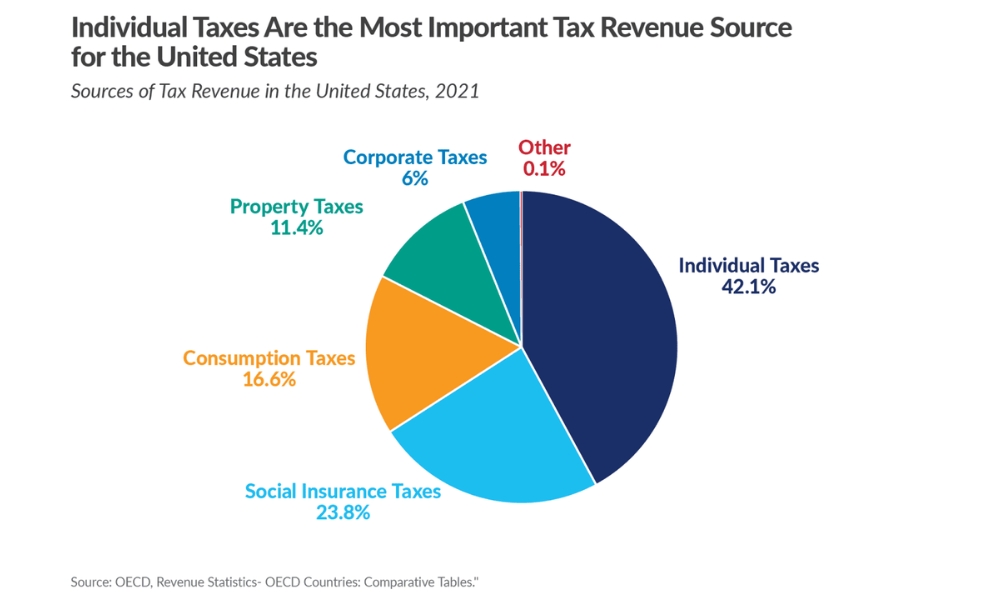Taxes – a word that often elicits a sigh or groan from many of us. Even though I want to cancel them completely, many argue they are an essential part of our financial landscape. As citizens of the United States, we are subject to a variety of taxes, each serving a “distinct purpose”. Not sure how much I buy that after looking at my most recent W-2, but whatever.
From income taxes to sales taxes, property taxes to payroll taxes, our wallets are constantly being tapped. With so many different taxes to navigate, understanding what we owe, and why, can feel overwhelming. But fear not! We are here to demystify the tax system, providing you with the knowledge you need to make informed financial decisions. Whether you’re a seasoned taxpayer or just starting out, this guide will equip you with the insights to manage your tax obligations efficiently.

The Different Types of Taxes
Income Taxes
Pain. No other way to describe it. Income taxes are one of the most significant types of taxes that individuals in the United States pay. They are levied on the income earned by individuals and businesses. The IRS is responsible for administering and collecting income taxes. The tax rates are progressive, meaning that they increase as your income increases. This ensures that individuals with higher incomes pay a higher percentage of their earnings in taxes (yeah right).
There are various forms of income taxes, including federal income tax, state income tax, and local income tax. The federal income tax is the largest source of revenue for the U.S. government, funding essential programs and services. State income taxes vary from state to state and are used to fund state-specific initiatives. Local income taxes are imposed by some cities or municipalities to generate revenue for local projects.
Sales Taxes
Sales taxes are another type of tax that individuals encounter on a daily basis. They are imposed on the sale of goods and services and vary from state to state. Unlike income taxes, which are based on earnings, sales taxes are based on the purchase price of taxable items. The rates can range from a few percent to double-digit percentages, depending on the location.
Sales taxes play a crucial role in funding state and local governments. They are commonly used to finance public services such as education, transportation, and healthcare. It’s important to keep in mind that not all states impose sales taxes on the same goods and services. Some states exempt necessities like groceries and prescription drugs from sales tax, while others do not.
Property Taxes
Property taxes are levied on the value of real estate, including land, buildings, and improvements. They are typically imposed by local governments and vary based on the assessed value of the property. Property taxes are an important source of revenue for local governments, funding public schools, infrastructure projects, and other community services.
The amount of property tax you owe is determined by multiplying the assessed value of your property by the local tax rate. Assessments are typically conducted periodically to reflect changes in property values. It’s worth noting that property taxes can be a significant burden for homeowners, especially in areas with high property values.
Excise Taxes
Excise taxes are levied on specific goods and services, such as gasoline, tobacco, alcohol, and luxury items. They are often referred to as “sin taxes” because they are designed to discourage the consumption of potentially harmful or non-essential products. Excise taxes are typically included in the purchase price of the goods or services and are collected by the seller or retailer.
The rates of excise taxes can vary widely depending on the product. For example, gasoline taxes are charged per gallon, while tobacco and alcohol taxes are based on the quantity or percentage of the product’s price. Excise taxes are an important source of revenue for both the federal and state governments, contributing to funding various programs and initiatives.
Estate and Gift Taxes
Estate and gift taxes are imposed on the transfer of wealth from one individual to another. These taxes are levied on the total value of an individual’s estate after their death, while gift taxes apply to transfers made during an individual’s lifetime. They are designed to prevent the accumulation of extreme wealth and ensure a more equitable distribution of assets. Again, the rich know how to dodge these effectively as well.
The federal estate tax applies to estates above a certain threshold, which is periodically adjusted for inflation. It’s worth noting that not all states impose estate or gift taxes, and the thresholds and rates can vary. Planning strategies, such as trusts and lifetime gifts, can help minimize the impact of estate and gift taxes.
Payroll Taxes
Payroll taxes are taxes imposed on wages and salaries by both the federal government and state governments. These taxes fund social security and Medicare programs, which provide retirement, disability, and healthcare benefits to eligible individuals. Payroll taxes are typically withheld from an employee’s paycheck by their employer and are based on a percentage of their earnings. More lines on my paycheck taking my pay closer to $0.
The federal payroll tax consists of two parts: the Social Security tax and the Medicare tax. The Social Security tax is levied on income up to a certain limit, while the Medicare tax applies to all wages and salaries. State payroll taxes, if applicable, vary from state to state and are used to fund state-specific programs.
Business Taxes
Business taxes encompass a wide range of taxes that are imposed on businesses. They include corporate income tax, self-employment tax, employment taxes, and various excise taxes. The rates and requirements for business taxes vary depending on the structure and size of the business.
Corporate income tax is levied on the profits of corporations, while self-employment tax applies to individuals who work for themselves. Employment taxes, such as the Federal Unemployment Tax Act (FUTA) tax and state unemployment tax, fund unemployment benefits for eligible individuals. Excise taxes are imposed on specific goods and services, similar to excise taxes for individuals.
Understanding The Scam
After reading all of that, isn’t it exhausting? Regardless of how you feel, your pocket is going to keep getting picked. Understanding the different types of taxes we pay is essential for managing our financial obligations effectively. Each type of tax serves a distinct purpose and you’ll find yourself in deep trouble if you don’t get these right. By familiarizing ourselves with the intricacies of the tax system, we can make informed decisions and ensure compliance with our tax obligations.
Taxes play a crucial role in funding essential programs and services, such as education, healthcare, and infrastructure. They shape our nation’s economy and contribute to the overall well-being of our communities. Whether you’re an individual or a business owner, taking the time to understand the different types of taxes will empower you to navigate the complexities of the tax system with confidence.
So, the next time you cringe at the thought of taxes, remember that they are a necessary part of our financial landscape. Knowledge is power, so take the opportunity to learn about taxes and discover how they shape our nation.
Now that you have a comprehensive overview of the different types of taxes, you are better equipped to navigate your tax obligations. Remember to consult with tax professionals and stay up to date with changes in tax laws to ensure compliance and maximize your financial well-being. I was once told “a man who files their taxes by themselves are the same people who would represent themselves in court”. Do the right thing, hire a professional and get yourself financially right.



Leave A Comment